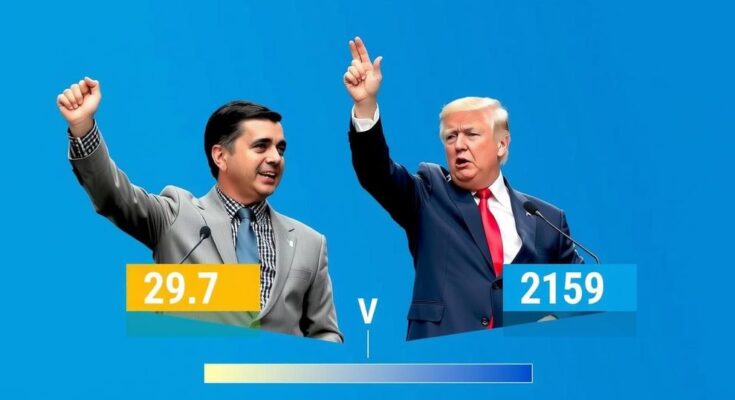Uruguay’s presidential runoff features Álvaro Delgado of the National Party and Yamandú Orsi of the leftist Broad Front. The election highlights rising voter angst surrounding crime and social inequality. Both candidates offer contrasting approaches. The election is vital, demonstrating heightened political engagement and a robust democratic process in Uruguay.
Uruguay held a pivotal presidential runoff election on Sunday, spotlighting fierce competition between Álvaro Delgado, the candidate from the ruling National Party, and Yamandú Orsi of the leftist Broad Front coalition. The runoff emerged after neither candidate secured a clear majority in the initial voting round on October 27. With the Broad Front capturing 44% of the vote, the National Party accounted for 27%, moderated by the support of other conservative factions that cumulatively achieved 20%, thereby offering Delgado a meaningful advantage in the subsequent election.
The race has cultivated an atmosphere of intense contestation, in stark contrast to previous elections characterized by lower levels of engagement. As both candidates advocate their positions amid rising concerns over violent crime and economic inequality, they grapple with a voter base affected by indecision; nearly 10% remain undecided, as they prioritize social spending and stability over divisive rhetoric. Analysts observing the campaign dynamics noted that the electoral landscape does not display a pronounced anti-establishment sentiment, which has been prevalent in other regions.
Álvaro Delgado, a candidate committed to extending the legacy of the current administration led by Luis Lacalle Pou, emphasizes his intention to uphold business-friendly policies and address crime with stringent measures and the establishment of a new maximum-security facility. Conversely, Yamandú Orsi advocates for a collaborative approach to crime prevention while attempting to nurture a “new left” within Uruguay’s political framework, albeit without drastic reforms that would threaten economic stability.
Notably, this election is reflective of the nation’s robust democratic framework, illustrated by former President José Mujica’s statement acknowledging the importance of negotiations in a potentially divided parliament. Both candidates face the challenge of navigating the complex socio-political realities that lie ahead, as indicated by public skepticism towards transformative policies and recent failures of referendum initiatives aimed at increasing pension benefits.
Overall, the Uruguay elections denote significant political engagement, a departure from the previously predictable electoral behavior, and a healthy indication of democratic vitality, underscoring the balanced expectations of its citizenry.
The election reflects an evolving political landscape in Uruguay, transitioning from stable governance under the previous Broad Front coalition to a contest characterized by varying ideologies and strategies. The Broad Front had previously governed for 15 years, notable for progressive policies such as the legalization of abortion and same-sex marriage. The current election cycle has revealed a division within the populace regarding socioeconomic issues and crime, necessitating careful appeals from both candidates to engage undecided voters and navigate the complexities of coalition governance in a tightly contested political environment.
The presidential runoff in Uruguay symbolizes a critical juncture in its democratic process, revealing a population eager for decisive leadership amid pressing issues. Both candidates present distinct platforms yet face a collective challenge of fostering unity and addressing the concerns of their constituents in a post-election governance landscape. With a significant percentage of voters still undecided, the outcome remains pivotal not only for political factions but also for the socioeconomic direction of the nation as it strives to maintain stability and progress.
Original Source: www.voanews.com




